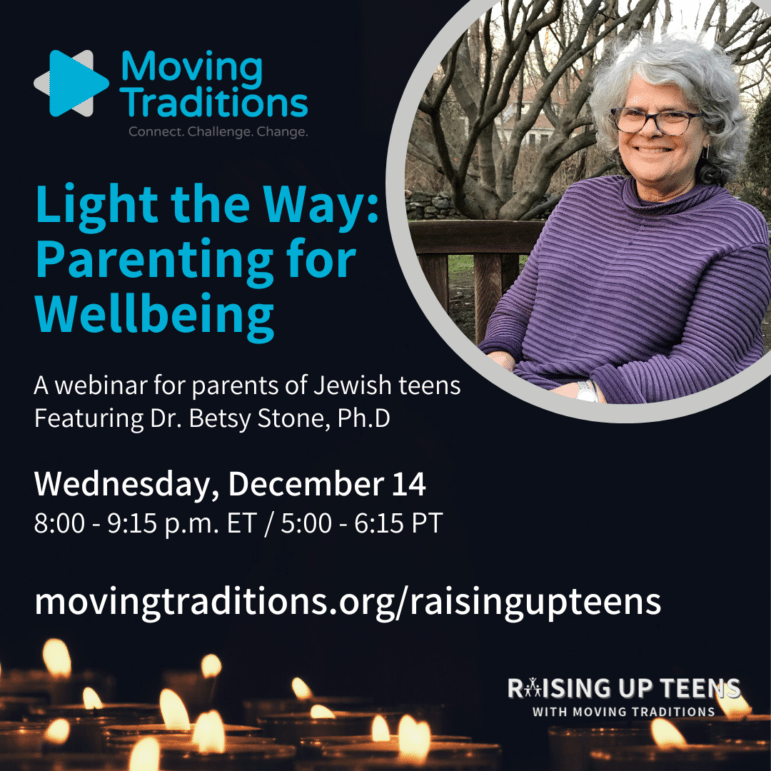These seven key takeaways were shared by Psychologist Dr. Betsy Stone in conversation Rabbi Tamara Cohen, Chief Program Officer at Moving Traditions on our December 14, 2022 webinar and compiled by Alisha Pedowitz, Director of Teen Education.
Light the Way: Parenting for Wellbeing was offered as part of Raising Up Teens with Moving Traditions, a series of free webinars for parents of Jewish teens.

Seven Key Takeaways
- It’s time to stop talking about “getting back to normal.” This is now the normal—let’s focus on what that is, and what they need in this normal. Focus on their strengths, what they have gained, rather on what they have lost.
- Phones and other devices have become a primary way our kids (and us) connect. They are also built on technology that is designed to be addictive. When we tell our kids “put your phone down” it ignores this reality, and is the equivalent of “just say no.” Instead, we need to help them build the skills to navigate this. We also need to lead by example and examine our own behavior too. For example:
- At dinner time, say: “for the duration of this meal, we all put our devices away in order to all be present.”
- Acknowledge that it’s challenging for us as well; talk about that challenge together. Model the building of “struggle muscles.”
- The goal of parenting is not to make our kids happy. Rather, we need to help our kids internalize core values which they can use to navigate life. To do this, we need to identify these core values and find ways to name them in conversations with our kids.
- From our CultureShift trainings, we offer an activity called “Values At the Center:
- On a notecard, in a journal, on your computer—write out the 2-3 values you want your teens to navigate from when faced with challenges.
- Need some ideas of values to use? Please reference our Thanksgiving 2020 Discussion Guide for a few possibilities.
- Share with your teen what your values are and why. How do you hope they will use this when feeling challenged or having a hard time?
Say: “When you are having a hard time, my hope for you is…”
- From our CultureShift trainings, we offer an activity called “Values At the Center:
- Parent with a strengths-based approach: consider who your children are, and what are their strengths? Figure out who your child is uniquely, and build around their strengths.
- Write down a few adjectives that describe your child. What are the strengths associated with those adjectives? How can you help your child continue to practice and build up those strengths?
- Take a look at the resources on The Science of Character/Let It Ripple website. It has a “Periodic Table of Character Strengths” and discussion guides by age about building these character strengths. Along with these resources, use Moving Traditions’ shleimut/hesed/tzedek framework for cultivating teen wellbeing:
- Shleimut (personal wholeness):
Ask: In looking at these character strengths—which ones make you feel like your fullest/most whole self when you act upon them? Which ones would you like to cultivate further to achieve that sese of wholeness? - Hesed (kind, caring personal connections):
Ask: Which of these strengths do you draw on most in your connections with others? Is there any support you need or want from me in building those connections? - Tzedek (pursuit of justice):
Ask: Of these character strengths, which do you think you naturally utilize when you see something wrong or unjust in the world around you? What does it look like when you do? How can support you when you are doing so?
- Shleimut (personal wholeness):
- The power of “weak ties”: weak ties refer to our social connections with people who we don’t interact with daily but who we share a connection with (“strong ties” are they people with whom we interact act with most regularly and deeply). Research points to the importance of weak ties in that they help us experience our own humanity through small interactions with others in powerful ways. Through the pandemic, our children experienced less of these weak ties. Return to in-person school and other activities is allowing them to experience these again, as well as through the return to other adults in their lives. From a “hesed” standpoint—we can help and encourage our children to practice and use the social skills that build these connections.
- Build your own parenting network. In toddler years, we have other parents and resources we turn to. We need that also during the adolescent years—we as parents are learning as we go. Talk with the parents of your friends’ kids; have other parents you trust to reach out to and talk things through. Model to your teens that you turn to others for support and that you seek other resources and perspectives to inform how you continue to learn and grow as a parent. Model that shleimut (personal wholeness and wellbeing) and hesed (caring connections) go hand and hand for you, as well.
- Your teens want to and need to be heard, but also know that you provide the security of parenting boundaries. Your rules and boundaries may shift as you understand their perspective and experiences, but you ultimately help provide the structure and security of those boundaries. When you parent, you are reliable. When you friend, you are unreliable.
- And: you are not an expert in the experiences and lives of teens today, but you live with one! The best answer to “you just don’t understand!” is, “teach me, I want to understand.”

